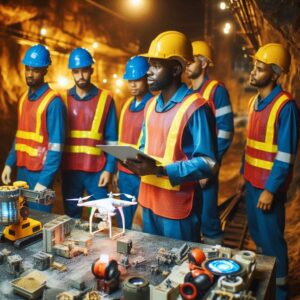African Mines Get a Boost as Robots Revolutionise Industry

Johannesburg - Africa's vast mining sector is poised for a revolution, with industrial robots set to become the pickaxe of the future, according to a new industry forecast.
A global surge in robotics is predicted to see the industry balloon to a staggering $586 billion by the end of the decade, with industrial robots leading the charge. While sales already hit a healthy $14.6 billion in 2020, analysts at GlobalData predict a phenomenal 38% compound annual growth rate, taking the market value to a jaw-dropping $352 billion by 2030.
"This is a game-changer for African mining," enthuses Dr Aisha Diallo, a leading robotics engineer at the University of Cape Town. "For decades, we've relied on traditional methods, often putting miners at risk. Robots offer a safer, more efficient way to extract our resources."
Robots to the Rescue
Automation is no stranger to heavy industry, having already transformed manufacturing through improved efficiency and quality control. But in Africa's mining sector, robots are poised to play a far more profound role.
Thinner, nimbler robots equipped with cutting-edge artificial intelligence (AI) and cloud computing are set to revolutionise mine maintenance. By analysing vast amounts of data, these machines can predict and address equipment failures before they occur, preventing costly downtime and keeping mines productive.
"These robots can become our eyes and ears in the most dangerous areas of a mine," explains Diallo. "They can navigate tight spaces, inspect pipelines and boilers, and even carry out repairs – all without putting a single human life at risk."
Taking the Peril Out of Pipelines
One of the most significant challenges in mine maintenance is ensuring the integrity of pipelines that transport hazardous materials. Traditionally, inspecting these pipes involved complex dismantling or risky rope-access techniques.
"Robots are a far safer and more efficient solution," says Diallo. "Imagine an unmanned ground vehicle (UGV) slithering through a pipeline, meticulously examining the interior for corrosion or damage. This not only protects lives but also saves time and money."
Local Innovation Leads the Way
While Africa is poised to benefit from this global technological revolution, the continent is also taking a leading role in developing its robotic solutions.
South African company IGS is at the forefront of this innovation. Their industry-leading Metalspray PipeID rover is a self-propelled marvel that can navigate pipelines autonomously, applying a protective alloy coating to prevent corrosion.
"This technology is a game-changer for African mines," says IGS product manager Al Geraskin. "It extends the lifespan of critical infrastructure, reduces maintenance costs, and most importantly, protects the lives of our miners."
A Brighter Future for African Mining
The adoption of industrial robots in African mining promises a future that is safer, more productive, and more sustainable. With intelligent machines taking on the most hazardous tasks, human workers can focus on higher-value activities, transforming the mining sector into a more skilled and knowledge-driven industry.
"This is a golden opportunity for Africa," concludes Diallo. "By embracing robotics, we can ensure our mines are not just productive, but also safe and environmentally responsible. The future of African mining is bright, and robots are leading the way."
Beyond Safety: Boosting Productivity and Sustainability
The benefits of robotics extend far beyond safety. By automating repetitive tasks, robots can significantly improve productivity in African mines. Imagine a tireless drone autonomously surveying vast mining pits, generating high-resolution data to optimise extraction routes and Maximise resource yield. This level of precision can dramatically reduce waste and make African mining operations more sustainable.
"Robotics can also play a vital role in environmental protection," adds Diallo. "For instance, robots can be deployed to plant trees in reclaimed mining areas, accelerating the process of ecological restoration."
A Skills Revolution for African Miners
The rise of robots doesn't necessarily signal the end of jobs in African mining. Instead, it presents an opportunity to transform the workforce into a highly skilled cadre.
"We'll need technicians to program, maintain, and operate these robots," explains Diallo. "Data analysts will be required to interpret the information robots collect, while safety specialists will ensure these machines function seamlessly alongside human workers."
This transition will require investment in education and training programs to equip African miners with the necessary skills to thrive in this new era of robotic mining.
Building a Sustainable Future Together
The adoption of robotics in African mining is not simply about mimicking developed nations. It's about leveraging technology to build a safer, more productive, and sustainable mining industry that benefits both the continent and the environment. By embracing innovation and empowering its workforce, Africa can ensure its mines remain not just a source of valuable minerals, but also a spring.
